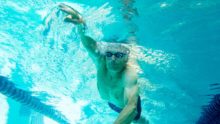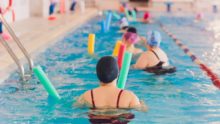
Swimming following the Covid-19 pandemic
28/05/2021Everyone has been affected by the Covid-19 pandemic and one third of the UK population have had the virus. Since the Covid-19 lockdowns and pools reopening, you may still lack confidence in being able to go to your local pool.
Read on to find out more about swimming following the pandemic and help you with any concerns before returning to the water.
What is Covid-19?
Covid-19 is a highly infectious disease, which mainly affects the lungs. It has a wide range of severity, with some people showing no symptoms to some becoming critically ill.
Common symptoms include a fever, a dry cough and loss of taste and smell, shortness of breath, feeling tired or exhausted, an aching body, headache, sore throat, blocked or runny nose, loss of appetite, diarrhoea, feeling sick or being sick. The experience of illness and recovery can differ from person to person. A number of patients are experiencing long term symptoms after the acute illness (sometimes referred to as ‘Long Covid’).
These lasting effects cover a range of symptoms including:
- fatigue
- muscle and joint pains
- shortness of breath
- chest pain or tightness
- poor concentration and forgetfulness
- palpitations
- dizziness
- anxiety.
Even those who have not been ill may be feeling out of shape and isolated or anxious regarding a return to the pool. Progressive physical activity is a cornerstone of a functional recovery. Water-based activity can be part of formal rehabilitation and should be person-centred, supported by a range of different health professionals.
Why consider swimming as part of Covid-19 recovery
People often do not realise how good swimming is as an exercise, because they do not feel sweaty while doing so, but the benefits can be significant. Swimming and related activities have been shown to offer benefits due to the unique aquatic environment. These unique properties may be helpful in supporting those who are recovering from Covid-19, and those who are feeling out of shape.
- The warm supportive nature of water is ideal for muscle and joint pains and for those who are overweight.
- A whole body work out promotes flexibility and strength gains without impact loading on joints.
- Appropriate progressive activity helps recondition the heart and blood circulation system.
- Swimming focuses on controlled, rhythmical breathing which can support lung function and help mindfulness, relieving anxiety.
- Moving against the resistance of the water is a good way of building strength, balance and co-ordination.
- There are many options for non-confident swimmers.
Safety of the pool environment
Although access to pools has been restricted during lockdown periods, swimming pools are one of the safest environments to be in and it is accepted that current water treatment methods used inactivate viruses such as Covid-19. Indoors, pool air circulation systems are also designed to remove the air above the surface, which should also assist in removing any viruses floating in the air. Most pools provide the benefit of a supervised environment with first aiders available at all times and some may also have specialist wellbeing advisors who can provide support.
Many pools may have also re-organised their timetables due to the pandemic, so it may be worth checking to see what is available and if there are more gentle sessions to choose from.
When to return to the pool?
- There is no simple answer to this. You need to feel ready and to have sufficiently recovered, such that you are finding day to day tasks easier. You should be able to dress and undress as normal and walk short distances outside at your own pace.
- Many people have pre-existing health conditions which may add limitations where swimming is concerned. But planning ahead and starting gently will make swimming worthwhile for most health conditions.
- Individuals with access to structured rehabilitation can discuss how to re-introduce aquatic activity with their rehabilitation team.
When not to return to the pool?
- If you develop new symptoms consistent with Covid-19, you should isolate and take the necessary medical advice.
- If you have a continuing raised resting heart rate or fever.
- Continuing shortness of breath on minimal activity (or having known low oxygen saturation levels) would suggest further medical advice is needed.
- When advised against exercise by a medical practitioner or rehabilitation team.
Tips for swimming after a Covid-19 related infection
Do:
- attend with a friend or family member for support and look for a quiet session in shallow water the first time.
- pace yourself and keep levels of exertion to comfortable levels initially. The talk test is a simple way to measure intensity by being able to talk comfortably when working at low intensity, or perhaps in between lengths when pool swimming. If you can talk, but not sing, you are working at moderate intensity.
- keep a note of the amount of exercise you do. Monitoring things like minutes completed, lengths swam or repetitions completed, and if possible monitoring heart rate, can help to demonstrate improvements over time.
- simple aquatic exercises, for example, walking in the water, arm sweeps, lunges etc., if you are not ready or able to swim.
- return to pool swimming before open water swimming as this will be less stressful and safer.
- contact your rehabilitation team or General Practitioner for advice, if you develop new symptoms or your condition worsens.
Don’t:
- expect too much too soon from yourself. Feeling tired is normal at first and this should improve with time.
Additional advice about Covid-19 recovery and swimming
- NHS advice on long-covid.
- Moving Medicine resources on Covid-19 recovery.
- Supporting your recovery after Covid-19.
*This has been written by experts based on the best evidence around Covid-19 and will be updated as more information becomes available.
Health Fact Sheets
Swim England’s Health Commission group have developed a range of fact sheets on swimming with particular health conditions, written for competitive swimmers, the general public and to also assist those who support or advise swimmers.
Listed below is the current fact sheet library for people with health conditions.
To view and download fact sheets written specifically for people who support or advise swimmers, head to our Health and Wellbeing pages.
 Just Swim
Just Swim



